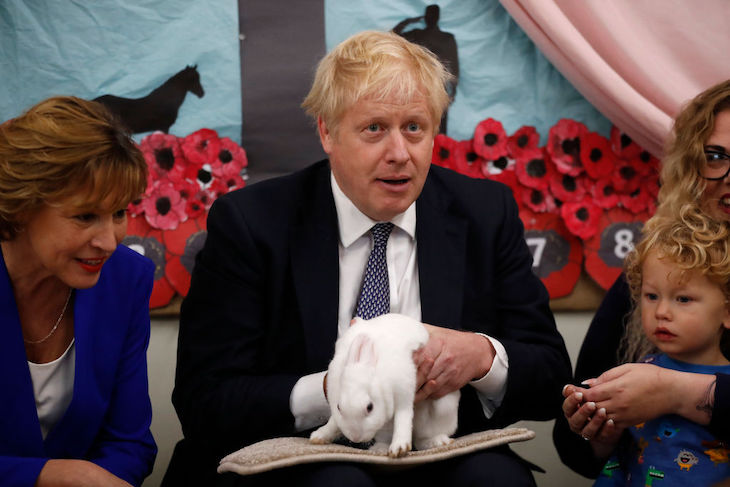A question I don’t expect my colleague Julie Etchingham to put to the two party leaders in ITV’s debate is the one that has been nagging away at me for days: why is the policy-making that will underpin the election manifestos we’ll get from the parties over the next few days so lacking in intellectual rigour?
What we have from both parties are big ambitions – ‘free broadband for everyone’ from Labour, ‘Brexit totally done and dusted by the end of 2020’ from Boris Johnson – based either on a highly selective use of second-hand research (Labour’s analysis of the costs and practicability of nationalising full-fibre broadband roll-out) or predicated on the challenging notion that Johnson has near magical negotiating skills.
Politics these days seems all about tugging at our emotions, rather than coming up with proposals whose tyres can actually be kicked.
It is a degradation of discourse that first became conspicuous during the Brexit referendum in 2016.
But what I can’t judge is whether today’s flabby arguments are the consequence of the collapse in standards that took place during the referendum – the first outing for the idea that experts are not to be trusted – or whether the lousy content of the referendum arguments was a consequence of broader cultural and media changes (the hegemony of emotion in social media would be one explanation).
It was not always like this.
As political editor of the FT in the 1990s, I was literally deluged with detailed and densely argued legal and economic documents from New Labour that paved the way for Gordon Brown’s highly controversial plan to levy a windfall tax on the excess profits of the privatised utilities.
And the Brown/ Balls Treasury team was just as fastidious when it came to their bold plan to give autonomous control over interest rates to the Bank of England.
So when Blair’s Labour won the election by a landslide in 1997, both bold policies were ‘oven-ready’, to coin Johnson’s current Brexit cliché of choice, and could be implemented remarkably smoothly and rapidly.
How different from what we see from both big parties today.
For example, Boris Johnson says he wants an ‘Australian points-based system’ to determine which immigrants with which skills would be good for the economy and should therefore be let into the UK. But the Tories also say migrants could only come here if already furnished with a job offer.
Now both ambitions are comprehensible. The problem is they are incompatible – in that Australia does not insist that all migrants must know in advance where they will be working.
And don’t get me started on whether there is the faintest chance Johnson can negotiate and implement a comprehensive trade deal with the EU by the end of 2020, which he told me only a few days ago would be even easier than pie.
As for Labour’s plan to provide free, fast broadband access to all of us, its cost estimate – £20 billion for digging up the ground and laying the fibre – is based on calculations made for the government and by the government for an assessment of what it would cost to roll out and operate a fibre network in the current conditions of a competitive market. Which is not remotely what Labour plans.
That said, research provided to DCMS by the consultancy Frontier Economics do cite a £20.3 billion estimate for the capital costs of a ‘national monopoly’ rolling out a full-fibre network. But that same research also says that ‘the current [and proposed] EU framework precludes granting exclusivity to telecoms providers’.
In other words, Labour’s proposal to create a nationalised British Broadband monopoly provider of free WiFi would be illegal if the UK were to stay in the EU, or almost certainly if Labour were to negotiate a Brexit deal that delivers relatively frictionless access to the EU’s single market – which are the only two options on the table from Labour for what it would do if it wins the election.
So Labour’s EU policy – ambiguous as it is – is totally at loggerheads with its broadband pledge. And as importantly, it cites Frontier Economics as an expert on costs, but conveniently ignores what it says about legality.
And two other things.
First, there is a bizarre apples-and-pears approach to Labour’s number crunching because – as I mentioned – it gives a £20 billion cash estimate for the capital cost of the full fibre network but contrasts that with a “an average annual net present value” of the operating expenditure which is conveniently small at £230 million, and therefore does not look too scary as an increment to the tax burden.
But Labour conveniently chooses to ignore that Frontier Economics says the aggregate operating costs in cash would be an eye-watering £23 billion over the lifetime of the network. That lifetime is expected by Frontier to be 25 years, so the cash cost of operating the network would be a stonking £912 million per year on average – which would be a much bigger claim on future tax revenues than implied by the discounted number. And of course at £912 million a year the question is raised whether free broadband really is a good use for our taxes, even the taxes of the tech giants McDonnell plans to sting.
Second, Labour and McDonnell conveniently ignore Frontier’s published recommendation that competition in the broadband market would provide a better service to consumers than a monopoly provider (whether state-owned or privatised).
The fundamental point is that Labour has done no original analysis on any of this at all. It is piggy-backing off the work of one consultancy, which in turn was informing a government decision about a wholly different approach to providing full-fibre broadband.
And yet Labour is going in to the election with free broadband as one of its big “retail” offers.
To be clear. it is possible that the eventual costs (were Labour to win and implement the policy) would be somewhere in the ballpark of the numbers announced by McDonnell.
But if the history of government-provided infrastructure is any guide, the likelihood of this is about the same as monkeys. writing Shakespeare.
So here’s a question for all of you.
What have we done to deserve politicians in all parties treating us with contempt?
Is it that we have demonstrated, in the way that we pick a side in our pernicious culture wars, that we have no interest in the detail or practicability of a policy? That we’re just picking a side that makes us feel better about ourselves?
Or are party leaders playing us all for fools? And ultimately will we punish them all?
Robert Peston is ITV’s Political Editor. This article originally appeared on his ITV news blog
Got something to add? Join the discussion and comment below.
Get 10 issues for just $10
Subscribe to The Spectator Australia today for the next 10 magazine issues, plus full online access, for just $10.





















Comments
Don't miss out
Join the conversation with other Spectator Australia readers. Subscribe to leave a comment.
SUBSCRIBEAlready a subscriber? Log in